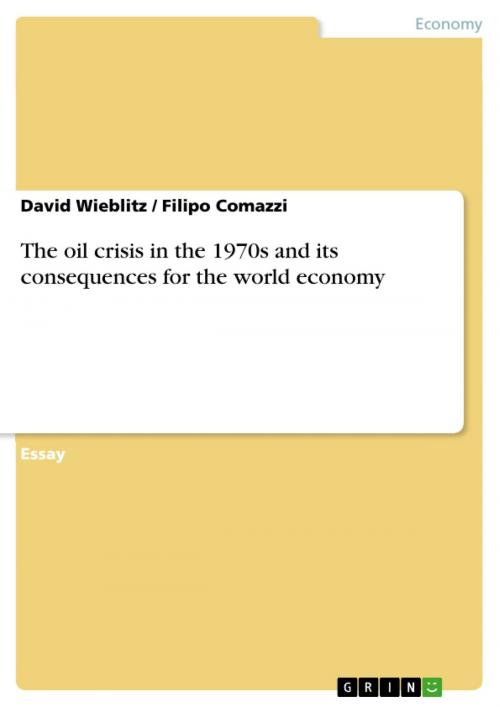The oil crisis in the 1970s and its consequences for the world economy
Nonfiction, Social & Cultural Studies, Social Science| Author: | Filipo Comazzi, David Wieblitz | ISBN: | 9783638525756 |
| Publisher: | GRIN Publishing | Publication: | July 23, 2006 |
| Imprint: | GRIN Publishing | Language: | English |
| Author: | Filipo Comazzi, David Wieblitz |
| ISBN: | 9783638525756 |
| Publisher: | GRIN Publishing |
| Publication: | July 23, 2006 |
| Imprint: | GRIN Publishing |
| Language: | English |
Essay from the year 2004 in the subject Business economics - Economic and Social History, grade: 2,0, Turku School of Economics (Department of economics), course: Economic History and Development, 9 entries in the bibliography, language: English, abstract: Nowadays oil is still the world's most important single source of energy. The world's industry is influenced by the cost of energy which, in turn, is influenced by the price of crude oil, taxation and other factors. If the cost of energy goes up, then prices of goods and services will increase, subsequently it will cause lower availability of products, higher transportation's costs and in turn lower economic growth. The latter will influence negatively the efficiency and productivity of the whole world's industry. This means that if oil prices go too high or too low there will be unlikely consequences for both oil producers and oil consumers. This paper analyzes the oil crisis of 1970ies. The first section concerns the history of the October War (6 - 23 October 1973) that led to the oil embargo, one of the most dramatic events for the world economy. The embargo lasted six months, beginning on 17 October 1973 and ending on 18 March 1974. The second section deals with the impact of the energy crisis on different countries. It caused terrible consequences for the economies of all industrialized countries such as recession, inflation, unemployment, lost economic growth and stagflation. But the essential question is whether the energy crisis was a real shortage or mainly a matter of politics.
Essay from the year 2004 in the subject Business economics - Economic and Social History, grade: 2,0, Turku School of Economics (Department of economics), course: Economic History and Development, 9 entries in the bibliography, language: English, abstract: Nowadays oil is still the world's most important single source of energy. The world's industry is influenced by the cost of energy which, in turn, is influenced by the price of crude oil, taxation and other factors. If the cost of energy goes up, then prices of goods and services will increase, subsequently it will cause lower availability of products, higher transportation's costs and in turn lower economic growth. The latter will influence negatively the efficiency and productivity of the whole world's industry. This means that if oil prices go too high or too low there will be unlikely consequences for both oil producers and oil consumers. This paper analyzes the oil crisis of 1970ies. The first section concerns the history of the October War (6 - 23 October 1973) that led to the oil embargo, one of the most dramatic events for the world economy. The embargo lasted six months, beginning on 17 October 1973 and ending on 18 March 1974. The second section deals with the impact of the energy crisis on different countries. It caused terrible consequences for the economies of all industrialized countries such as recession, inflation, unemployment, lost economic growth and stagflation. But the essential question is whether the energy crisis was a real shortage or mainly a matter of politics.















